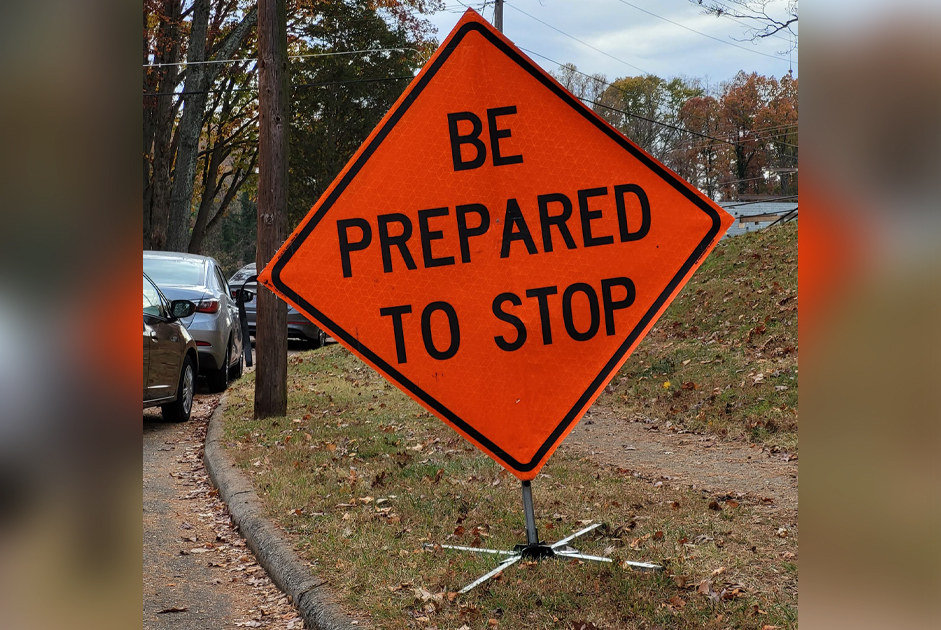BY RENEE SKUDRA
Driving into Winston-Salem on a late Friday afternoon, I suddenly had, what we used to call in English Literature graduate school, an epiphany. On the left shoulder of a hole-ridden, pockmarked highway, I saw a sign which said “prepare to stop.” Rushing to work (my usual mode), those words hit me like the proverbial ton of bricks – this message from the universe at large telling me to shift my ever-racing mind into slower and lower gear. At that very instant, my thoughts reverted to a classic 1966 movie I had just watched on-line – “Stop The World – I Want To Get Off” about a working-class stiff named Littlechap who is obsessed with being successful and will do anything to attain it, even as his own life spirals into intense unhappiness. He marries his rich boss’ daughter, becomes a member of the British Parliament, but is plagued with exponentially increasing problems. Deeply unhappy, each time something unsatisfactory happens, he stops the action of the film, directly faces the audience and calls out “stop the world” – precisely the sentiment that I have increasingly felt. The truth is that we all live in a culture which values speed and productivity, the “hustle mindset” which equates busyness with success – and we suffer immensely for it.
Since the 2020 Covid epidemic, I’ve admittedly become more anxious, unable to extirpate the voices of fear and trepidation, spending time in front of my computer constantly doom-scrolling, feeling burnt-out and overwhelmed. The world seems to be imploding and I along with it. Finally realizing that this all had to change (with a thank you to that road sign), I started reading about the slow moment and why it was so critical to slow down. After I read Carl Honore’s book, “In Praise of Slowness: Challenging The Cult Of Speed,” I was a believer.
Here is what I learned:
Society pushes all of us towards a lifestyle of over-achieving. We are urged to be more productive, with the result that we are cutting down on relaxation for the sake of achieving more. When you live at this constant breakneck pace, it exerts a huge toll on your mental and physical health, relationships and getting things done efficiently. However, when you slow your life down, the consequence of that is one which is calmer and more focused with the quality of your work improving. When you give yourself time to rest, you effectively refresh your entire system and can focus on what is truly important to your life while thrusting aside the moments of everyday, non-stop acceleration.
Carl Honore’s sage advice goes like this: “The great benefit of slowing down is reclaiming the time and tranquility to make meaningful connections – with people, with culture, with work, with nature, and with our own bodies and minds.” Mahatma Gandhi said it even more simply: “There is more to life than increasing its speed.” The road sign I saw that day powerfully reminded me that it was time to take back my life, put the cell phone away and stop worrying about answering the hundreds of emails that popped up every day that I never could get a grip on answering. My life was beset with unending worries – taking consummate care of my son, making scratch-made meals, working two jobs, paying the bills, cleaning the house and caring for the dog, the car, the extended family and the neighbors who needed help. I had literally disappeared into some vacuum where the essential “me” no longer existed.
As I read deeper into the literature of the slow moment, I realized that I had to recalibrate my relationship with the constantly switched-on, logged-in world. I started to follow the advice of making time to have fun. I drove to Raleigh for the heck of it, walking in different parks, taking photos of birds and other creatures I came across. I wandered – aimlessly. In accordance with strategies for slowing down, I began setting boundaries, saying no to things that didn’t align with my values or priorities. I disconnected from technology (phone, computer, TV) and started to savor small moments – time in nature, doing something creative with my hands, journaling, baking, playing piano and acts of service to others. I set the bar lower for happiness. As Honore averred in his book, there were palpable health benefits to slowing down: lowering stress which was adversely affecting my delicate, complaining stomach and decreasing my somewhat-too-high blood pressure. I began to feel better on every level.
When I started to slow down my pace of life, it became more mindful, intentional and fulfilling. I got rid of a lot of detritus that had been plugging up my life with details and urgency. I stopped feeling that I had to read every magazine that found its way into my house. I unashamedly prioritized self-care. A biologist friend told me that a philosopher named Lao Tzu had said “Nature does not hurry, yet everything is accomplished.” How true. I thank that orange Winston-Salem road sign for signaling to me the wisdom to live better, not faster.






















